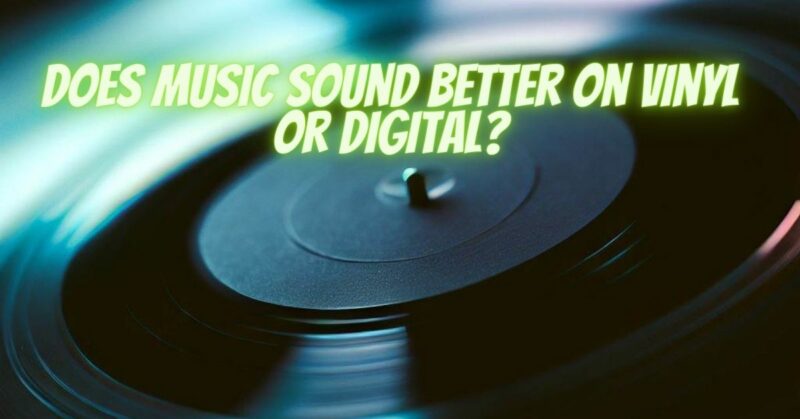The discussion surrounding whether music sounds better on vinyl or digital formats is a topic that has sparked passionate debates among audiophiles, music enthusiasts, and casual listeners alike. With the resurgence of vinyl records and the advancement of digital technology, the question of which format offers superior sound quality has become more relevant than ever. In this article, we’ll delve into the nuances of the vinyl vs. digital sound quality debate, exploring the characteristics of both formats and the factors that influence how we perceive their audio qualities.
Vinyl: Nostalgia and Warmth
1. Analog Warmth: Vinyl records are prized for their analog nature, producing a warm and organic sound that some listeners find more appealing and immersive.
2. Nostalgia: The ritual of placing a vinyl record on a turntable, along with the tactile experience and large album artwork, contributes to a nostalgic and intimate connection to the music.
3. Distinctive Sound: Vinyl’s inherent imperfections and surface noise can add character to the sound, giving it a unique charm that resonates with certain listeners.
Digital: Precision and Convenience
1. High Fidelity: Digital formats like CDs and high-resolution audio offer precise sound reproduction with wide frequency response and minimal distortion.
2. Convenience: Digital music can be easily accessed and transported through various devices, making it convenient for modern listening habits.
3. Consistency: Digital recordings remain consistent over time, unlike vinyl records that can degrade with repeated plays and exposure to environmental factors.
Factors Influencing Perception:
1. Equipment Quality: The quality of playback equipment, including turntables, amplifiers, speakers, and headphones, significantly impacts how music sounds in both formats.
2. Mastering and Production: The way music is mastered and produced for each format can influence its final sound quality, including compression, equalization, and dynamic range.
3. Personal Preference: Sound perception is highly subjective, and personal preference plays a significant role in determining whether one format sounds better to an individual.
Pros and Cons:
Pros of Vinyl Sound:
1. Analog Warmth: Vinyl’s warmth and character can provide a nostalgic and immersive listening experience.
2. Unique Sound: Imperfections and surface noise can contribute to a distinctive and authentic sound.
Pros of Digital Sound:
1. High Fidelity: Digital formats offer precise sound reproduction with minimal distortion.
2. Convenience: Digital music is easily accessible and compatible with various modern devices.
Cons of Vinyl Sound:
1. Surface Noise: Vinyl records are susceptible to surface noise, which can detract from the overall listening experience.
2. Limited Dynamic Range: Vinyl’s dynamic range is narrower compared to digital formats.
Cons of Digital Sound:
1. Digital Harshness: Some listeners perceive digital music as lacking the warmth and character of vinyl.
2. Compression: Certain digital formats may involve compression that impacts audio quality.
The question of whether music sounds better on vinyl or digital formats doesn’t have a definitive answer. Both formats have their strengths and weaknesses, and individual preference, equipment quality, and listening environment play significant roles in shaping how music is perceived. The resurgence of vinyl has rekindled a love for analog warmth and tactile experiences, while digital formats offer precision and convenience for the modern era. Ultimately, the choice between vinyl and digital comes down to personal taste and the kind of sonic experience that resonates with you most.


